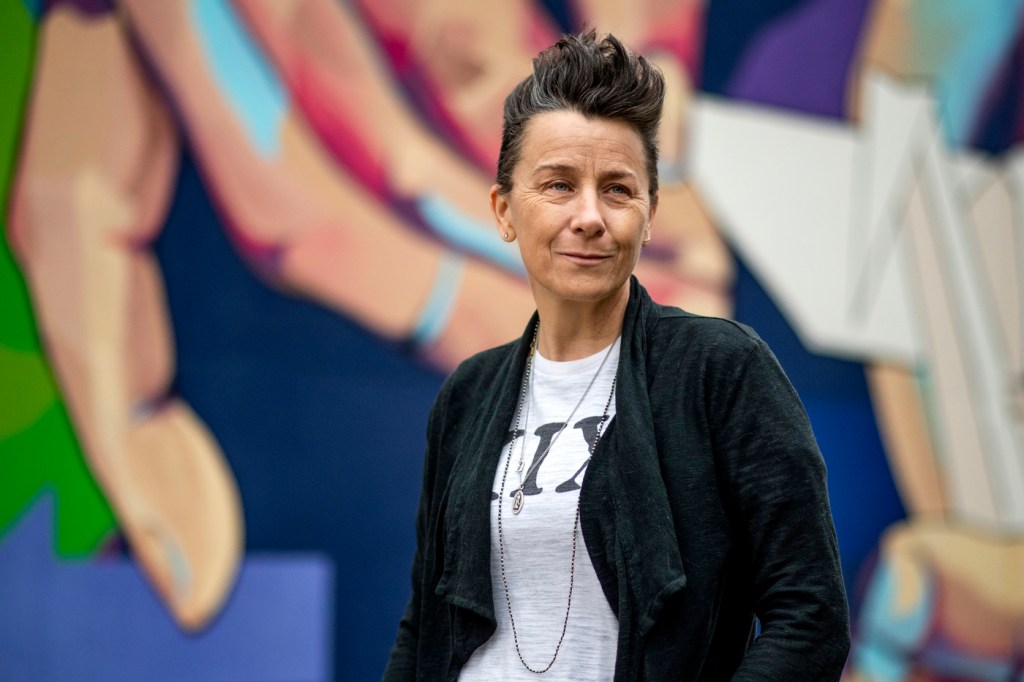Rocker and professor Melissa Ferrick reimagines ‘Everything I Need’ with acoustic version
Northeastern music professor Melissa Ferrick celebrates the 25th anniversary of her critically acclaimed album, “Everything I Need,” with a new acoustic version.

The 1990s are having a comeback. And while Northeastern University students roam the Boston campus in low-waisted wide-leg pants, cropped tops and faux fur coats, one can’t help but wonder how many are aware of a real ’90s treasure walking among them in Ryder Hall.
Enter Melissa Ferrick, a Northeastern professor of the practice in music and an acclaimed independent rock musician, who emerged in the early 1990s alongside such singer-songwriters as Alanis Morissette, Fiona Apple, Sarah McLachlan and Ani DiFranco.
This fall, Ferrick celebrated the 25th anniversary of her critically acclaimed album, “Everything I Need,” with an October release of an acoustic version titled “Everything I Need (The Q Sessions).”
Ferrick compares the album’s new version to a live intimate concert performed in the Q Division Studios in Cambridge, Massachusetts. She recorded the whole album in about eight hours, playing some songs just once and forgoing Auto-Tune or other enhancements, she says, for authenticity.
“There are some notes that are out of tune,” Ferrick admits. “I had to laugh at it in the studio and remain true to my belief that a live performance is a magical, beautiful thing, and it will never, ever happen again exactly the same way.”
Putting herself out there with imperfections, she says, requires a certain amount of bravado and she is proud of “leaving this album alone.”
The original 1998 album marked a pivotal moment in Ferrick’s life, following a particularly challenging period.
Ferrick’s big break came in 1991 when she opened for the British singer Morrissey on his tour in the U.S. and U.K., gaining attention from publications such as Billboard, The New York Times and The Village Voice.
This led to a deal with a major label, Atlantic Records. However, after two well-received albums but not enough record sales, the new leadership of the recording company dropped Ferrick, among other artists.
“It was actually, in hindsight, a really good learning experience about the business,” she says.
Losing that representation was a big blow to her sense of self-worth as an artist and a person. She had to find humility, Ferrick says, to start over again.
“At the same time, there was this incredible surge of autonomy and excitement over complete creative control, joy in the music-making process to a level that I really hadn’t had before,” she says.
While revisiting the songs for the new acoustic versions, Ferrick says she loved thinking about that young woman and remembering how coming into herself felt back then.
The Washington Post praised “Everything I Need,” comparing Ferrick’s rock songs to Morissette and Fiona Apple for their existential themes and her slower compositions to Sarah McLachlan’s folk-pop. Allmusic pointed out that the album offered both upbeat singable hit-material songs as well as a healthy dose of existential angst.
Lyrically, Ferrick has been always considered a strong songwriter, but she has made some changes to the re-recorded album melodically.
“I’m a better melody writer now than I was,” she says.
Editor’s Picks
Her favorite tracks on the record are “I like it that way” and “Fear and time.”
“It’s a very unstable, kind of sad song,” she says about the former. “There’s a bit of a calling of, ‘Can somebody understand me?’”
The original melody didn’t reflect its emotional complexity, she says, so she adjusted it to better communicate that there is a question and not a statement in the title of the song and the repetition of the phrase “I like it that way.”
The new album also features a cover of Tegan And Sara’s “Where does the good go.” The Canadian twin sisters opened for Ferrick on two U.S. tours before their rise to fame.
While being queer is a part of her identity, Ferrick has focused on building her career through her artistry rather than her sexuality.
“As far as representation goes, of course, I want that to get better,” she says. “But I do think that it’s a pigeon hole.”
Regardless how an artist identifies, she says, they should be taken seriously as “just an artist.”
Ferrick mainly writes songs about her own experiences of love and pain, her own struggles with sadness and understanding of the world. Lyrics come to her first, she says, “from nowhere” and all at once. She can also often hear the melody of a future song.
“Fear and time” is a departure for Ferrick because she typically doesn’t use pronouns or sing about men. The song delves into a friend’s relationship in which a woman distances herself from her male partner without proper communication, pushing him away.
“Yeah, that’s it. Wrap yourself up in yourself,” Ferrick sings in a powerfully evocative chorus. “And what are you going to find? Besides fear and time…”
“We think that going away and just paying attention to ourselves will somehow solve the relationship problem, and that then you’ll be able to come back and be in the relationship,” Ferrick says. “That has not been my experience.”
Ferrick will be performing at Club Passim in Cambridge, Massachusetts, on Dec. 27.











